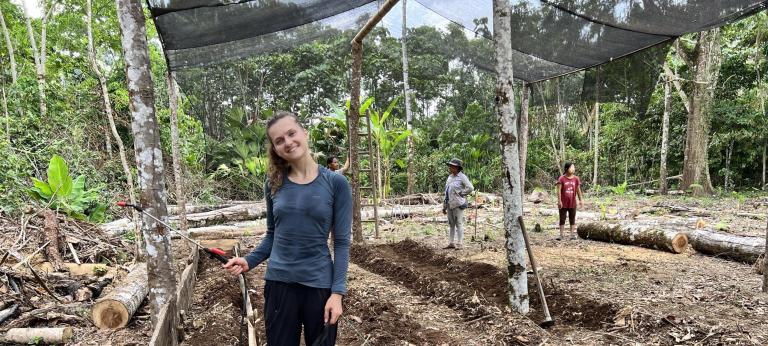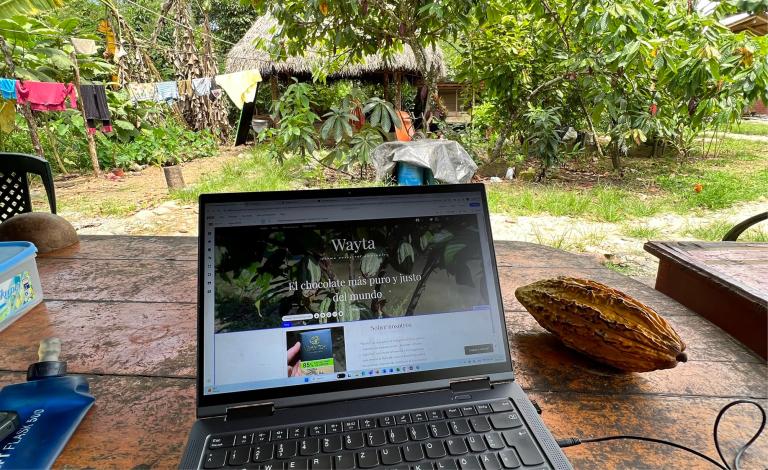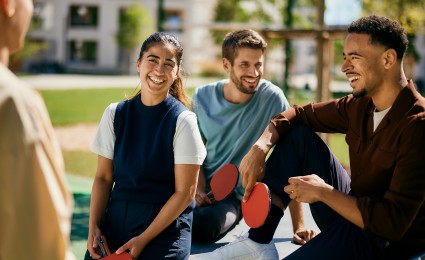

curious.
Alena's Social Fellowship: Reinforcing Amazonian indigenous cacao growers
Hello there, I am Alena, Project Manager at the Frankfurt office. It is a pleasure for me to share my incredible experience in the Ecuadorian Amazon jungle, which changed a lot about the way I see the world.
Recently, I had the opportunity to go on a three-month Social Fellowship to support indigenous people (called the Kichwa) in the Ecuadorian Amazon rainforest, in the place where the cacao plant originated. The reason for my choice was that I have always been driven to explore sustainable agricultural technologies during my work at Roland Berger. In addition to that, it impacted me a lot to see, year after year, articles about increasing deforestation of the Amazon rainforest, which absorbs about 25% of all our planet's CO2 and plays an incredible role in cooling the planet, acting as a natural "air conditioning" system, as well as being home to more species of animals and plants than anywhere on Earth.
While the majority of the world is impacting the climate through overproduction and overconsumption, Amazon indigenous communities stay true to nature by maintaining 100% organic and biological agriculture and trying to restore their motherland on a daily basis. This captured my interest and motivated me to get to know more about their life and to contribute as much as I could with the knowledge and skills I'd gained during my six years at Roland Berger.
_image_caption_none.jpg?v=1092873)
During the fellowship, my role was to support the development of the local agricultural association, Wayta, who focus on developing local chocolate production, made sustainably and fairly of organic cacao from local farmers.
The first thing I learned was that indigenous communities only speak two languages – their native one (Kichwa) and Spanish. So, by the end of my fellowship I went from 0 to almost fluent in Spanish and can say "ashka pagrachu", which means "thanks a lot" (in Kichwa) for this opportunity.
The second thing was that I tasted the most incredible chocolate I've ever tasted in my life. The brand name Wayta in the Kichwa language is translated as "aromas, smells, flavors", and there is no better description. It can be consumed without any additives, sugar, milk or vanilla, which are normally used in mass chocolate production, and it even serves as medicine, as reported many times by local consumers.
The community was very open to my support and we regularly aligned on the potential activities that I could contribute to. I was amazed by the bio-construction principles that they use for all of the cacao storage, fermentation and drying locations, and I helped with the construction of the new cafeteria on their site. It is almost 100% made of cultivated bamboo (even the nails and supporting elements).

In parallel, I worked on improving their media coverage by creating, from scratch, their website and Instagram account . Then I partnered with a global volunteering platform to increase the coverage and let more people around the globe know about this opportunity and also exchange experience.
I not only worked to support their development, but I also had a huge learning opportunity myself. Together with the local farmers, I passed a course from the Ministry of Agriculture in Ecuador on sustainable agricultural techniques, learned from indigenous people about medicinal plants, and planted cacao trees, vanilla and plantain (a variety of banana that tastes more like potato and serves as one of the main food sources). I also harvested and processed my own batch of cacao from tree to chocolate bar, and gave English classes to local communities.
This experience helped me to clearly see the importance of switching to organic and bio-production, to support as much as possible one of the most crucial and at the same time highly endangered regions of our planet, as well as to pay attention to the world around us and the impact each one of us makes on a daily basis, which then feeds into the whole ecosystem. I further realized that there is still so much to explore and learn from the indigenous cultures of the world. Every small step we can make matters.


_tile_teaser_h260.jpg?v=1079590)

